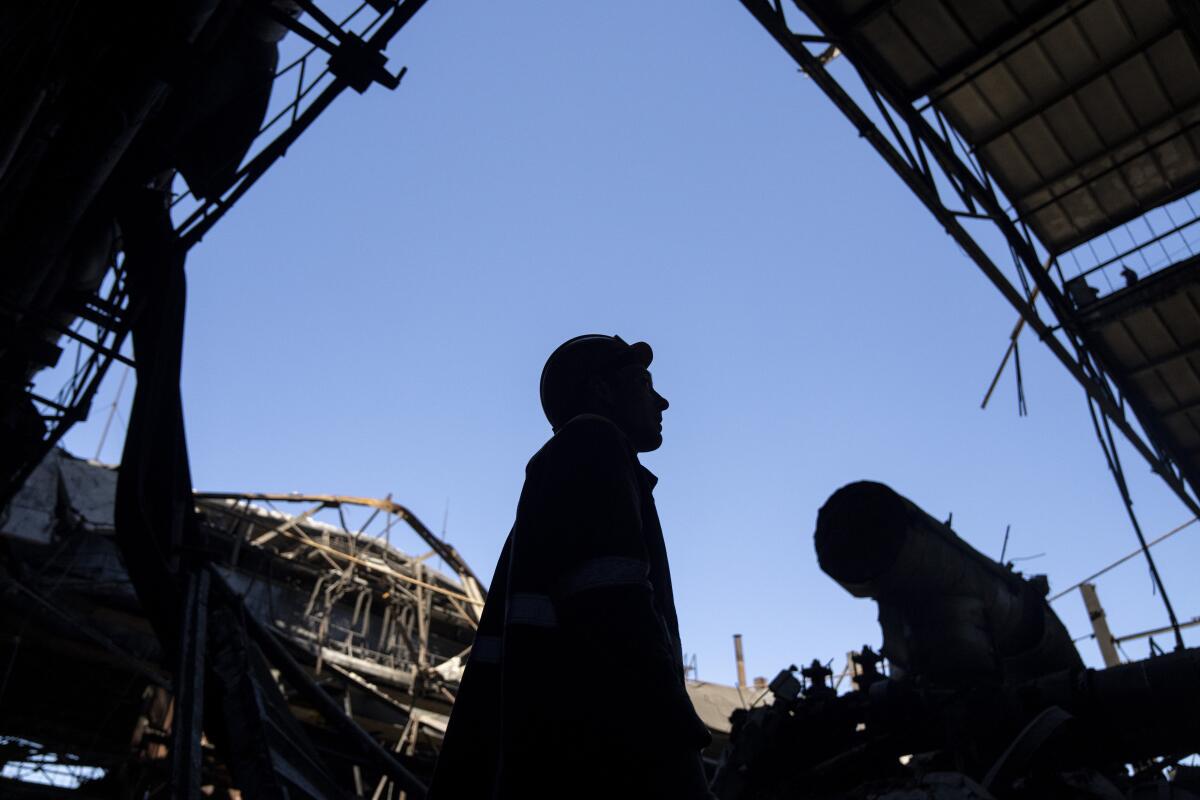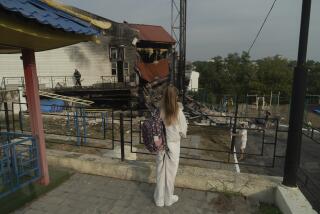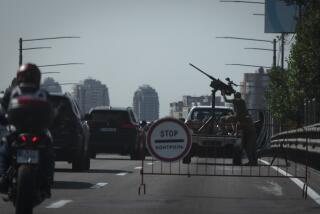Send us Patriots: Ukraine’s battered energy plants seek air defenses against Russian attacks

KYIV, Ukraine — Energy workers are struggling to repair the damage from intensifying Russian airstrikes on Ukrainian power plants, aimed at pulverizing the grid, hobbling the economy and sapping morale.
Staffers worry they will lose the race to prepare for winter unless Ukraine’s allies come up with air-defense systems like U.S.-made Patriot missiles to stop more destruction on already damaged plants.
“Rockets hit fast. Fixing takes long,” Oleh, a department chief at one plant that has been repeated struck by Russian aerial attacks, said in limited but forceful English.
The U.S. has sent Patriot missile systems to Ukraine and said last week it would provide more, following entreaties from President Volodymyr Zelensky.
The Associated Press on Thursday visited a plant owned by DTEK, the country’s biggest private energy supplier, days after a cruise-missile attack left it a mess of smashed glass, shattered bricks and twisted metal. The coal-fired plant is one of four DTEK power stations struck on the same day last week.
The AP was given access on condition that the location of the facility, technical details of the damage and workers’ full names are not published due to security concerns.
Kharkiv, Ukraine’s second-largest city, is facing intense Russian airstrikes, but its residents are defiant. “We can stand up, no matter what they do,” one said.
During the visit, State Emergency Service workers in hard hats and harnesses clambered to the twisted roof of a building, assessing damage and occasionally dislodging chunks of debris with a thunderous clang.
Ukrainian Foreign Minister Dmytro Kuleba told Foreign Policy magazine that half of the country’s energy system has been damaged by Russian attacks.
DTEK says it has lost 80% of its electricity-generating capacity in almost 180 aerial attacks since the start of Russia’s full-scale invasion in 2022. It estimates that repairing all the damaged plants would take between six months and two years — even if there are no more strikes.
Shift supervisor Ruslan was on duty in the operations room when the air alarm sounded. He sent his crew to a basement shelter but remained at his post when a blast struck only yards away.
He rushed out to darkness, dust and fire. He said he wasn’t scared, because “I knew what I needed to do” — he needed to make sure his team was OK and try to put out the flames.
Russia pummeled Ukraine’s energy infrastructure to devastating effect during the “blackout winter” of 2022-23. In March, it launched a new wave of attacks, one of which destroyed the Trypilska power plant near Kyiv, among the country’s biggest.
Russian President Vladimir Putin has framed the attacks as retaliation for Ukrainian strikes on Russian oil refineries.
Could Ukraine lose the war? Once nearly taboo, the question hovers in Kyiv, but Ukrainians believe they must fight for their lives against Putin’s troops.
Amid worsening Ukraine war outlook, an infusion of American military aid is seen as crucial in the fight against Russian invaders. Will it be enough?
Oleh said the Russians are “learning all the time” and adapting their tactics. Initially they targeted transformers that distribute power; now they aim for the power-generating equipment itself, with increasing accuracy. Russia is also sending growing numbers of missiles and exploding drones to exhaust Ukraine’s air defenses and is striking the same targets repeatedly.
DTEK executive director Dmytro Sakharuk said in March that out of 10 units the company repaired after earlier strikes, most had been hit again.
More Russian missiles have been getting through in recent months as Ukraine awaited supplies from allies, including a $61-billion package from the U.S. that was held up for months by wrangling in Congress. The package was approved in April, but it could be months before all the weapons and ammunition arrive.
Ukraine’s energy firms have all but exhausted their finances, equipment and spare parts fixing the damage Russia has wrought. The country’s power plants urgently need specialist equipment that Ukraine can no longer produce at sufficient speed and scale.
Ukraine’s port of Odesa is a key Russian target, endangering the city’s UNESCO-designated historic center and challenging citizens to keep their sense of humor.
Some 51 DTEK workers have been wounded in attacks since 2022 and three killed. Staff members say they stay on despite the danger because they know how crucial their work is.
Dmytro, a machine operator who was on shift during the recent attack and took shelter in the basement, said that when he emerged, “my soul was bleeding when I saw the scale of the destruction.”
He thought of the many people who had worked to build the mammoth plant.
“This was destroyed in a few seconds, in an instant,” he said.
Dmytro, who worked at Ukraine’s Zaporizhzhia nuclear power plant before it was seized by Russia, said he would continue to show up every day, “as long as I’m able.”
“It’s our duty toward the country,” he said.
Lawless writes for the Associated Press.
More to Read
Sign up for Essential California
The most important California stories and recommendations in your inbox every morning.
You may occasionally receive promotional content from the Los Angeles Times.














